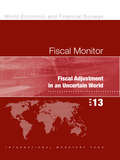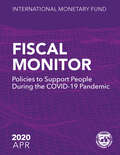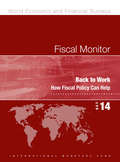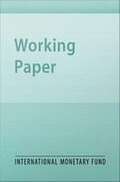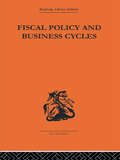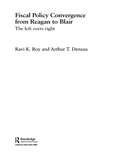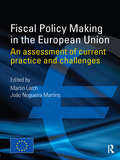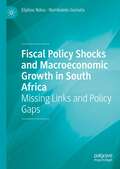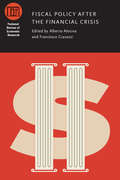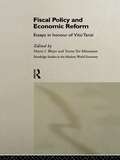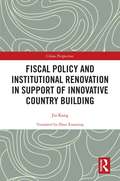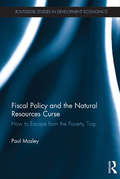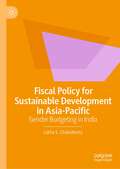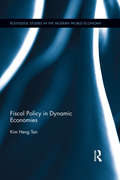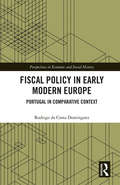- Table View
- List View
Fiscal Management of Scaled-Up Aid
by Richard Allen Sanjeev Gupta Duncan Last Isabell Adenauer Kevin Fletcher Shamsuddin Tareq Gerd SchwartzThe international community has committed to scaling up aid and improving aid delivery to low-income countries to help them meet the Millennium Development Goals. Other "emerging" donors, public and private, are increasing their assistance, and debt-relief initiatives are creating space for new borrowing. Remittances to low-income countries have been on a precipitous rise, and many countries are benefiting from high commodity prices. Fiscal Management of Scaled-Up Aid explores approaches to the sound fiscal management that will be required to ensure effective and sustainable use of these flows. With a medium-term perspective and efficient use of resources in mind, this paper addresses questions that shape fiscal policy response to scaled-up aid. Drawing on IMF Fiscal Affairs Department technical assistance to member countries, it outlines factors that should be taken into account in preparing an action plan for public financial management reform and proposes specific measures that will assist countries in strengthening fiscal institutions
Fiscal Monitor
by International Monetary FundIMF staff members examine the reason for the low interest rates paid for sovereign bonds issued by the U. S. and Japan, the sustainability of fiscal improvements in emerging economies, and how long it will take to lower public debt worldwide. Appendices review the theory of fiscal devaluation, analyze past privatization transactions, and track the main determinants of stock-flow adjustments over the last three decades. Color tables and graphs are provided. Annotation ©2012 Book News, Inc. , Portland, OR (booknews. com)
Fiscal Monitor April 2013: Fiscal Adjustment in an Uncertain World
by International Monetary FundA report from the International Monetary Fund.
Fiscal Monitor, April 2020: Policies To Support People During The Covid-19 Pandemic (Fiscal Monitor Ser.)
by International Monetary FundA report from the International Monetary Fund.
Fiscal Monitor, October 2014: Back to Work How Fiscal Policy Can Help
by International Monetary FundA report from the International Monetary Fund.
Fiscal Objective in the Post IMF Program World: The Case of Albania
by Jiri JonasA report from the International Monetary Fund.
Fiscal Policy & Business Cycles
by Alvin H HansenWritten during the Second World War against the background of the economic and political futility of the 1930s, this book deals with the changing role of government, and particularly fiscal policy as an instrument for regulating the national income and its distribution. Arguing that the war had an economic basis - the inability of the great industrial nations to provide full employment at rising standards of real income - the book discusses how the failure to achieve a world order in the political sphere must be sought in the facts of economic frustration.
Fiscal Policy Convergence from Reagan to Blair: The Left Veers Right (Routledge Frontiers Of Political Economy Ser. #Vol. 53)
by Ravi K. Roy Arthur T. DenzauThe elections of Bill Clinton and Tony Blair in the 1990s saw the consolidation and completion of critical aspects of the Reagan-Thatcher fiscal agenda. This impressive book critically analyzes this process. It has been previously thought that this process of adopting common fiscal policies was caused by economic integration and globalization, Fisc
Fiscal Policy Issues During the Transition in Russia
by Augusto Lopez-Claros Sergei V. AlexashenkoSince 1992, the Russian Federation has moved away from a command economy and has laid the foundation of a market-based system. This paper examines some of the key fiscal policy issues that arose in 1992-96, the period following the onset of economic liberalization and reform.
Fiscal Policy Making in the European Union: An Assessment of Current Practice and Challenges
by Martin Larch João Nogueira MartinsThis book examines key aspects of the measurement of fiscal policy making in the EU fiscal surveillance framework, highlighting strengths and weaknesses of current assessment practice. Based on the proceedings of a workshop organized by the European Commission’s Directorate-General Economic and Financial Affairs, the book’s contributions from leading experts will be of particular value to individuals and institutions involved in the fields of national and international economics and finance. Key Features: chapters are arranged within three main sections: Long-term sustainability; Measurement of the underlying budgetary position and discretionary fiscal policy; Reliability of fiscal indicators edited by Martin Larch and João Nogueira Martins expert contributors include António Afonso, Fabrizio Balassone, Fernando Ballabriga, Roy Barrell, Peter Brandner, Peter Claeys, Leopold Diebalek, Per Eckefeldt, Jonas Fischer, Daniele Franco, Jagadeesh Gokhale, Ian Hurst, Walpurga Köhler-Töglhofer, György Kopits, Martin Larch, Carlos Martinez-Mongay, James Mitchell, João Nogueira Martins, Jan in ’t Veld, Stefania Zotteri text amply supported by charts and tables. bibliography and Index
Fiscal Policy Rules for Oil Producing Countries: A Welfare-Based Assessment
by Wojciech MaliszewskiA report from the International Monetary Fund.
Fiscal Policy Shocks and Macroeconomic Growth in South Africa: Missing Links and Policy Gaps
by Eliphas Ndou Nombulelo GumataThis book explores the disconnect between fiscal policy and macroeconomic development in South Africa. It analyses the factors that have contributed to the lack of economic growth in the country over recent decades and outlines an improved fiscal policy framework that increases investment and employment. Particular attention is given to the impact of government debt and its relationship with GDP, the connection between budget deficits and interest rates, and how economic policy uncertainty affects employment dynamics and inflation. This book provides practical fiscal policy suggestions to increase economic growth in South Africa and Africa more generally. It will be relevant to researchers and policymakers interested in African economics and economic policy.
Fiscal Policy after the Financial Crisis (National Bureau of Economic Research Conference Report)
by Alberto Alesina Francesco GiavazziThe recent recession has brought fiscal policy back to the forefront, with economists and policy makers struggling to reach a consensus on highly political issues like tax rates and government spending. At the heart of the debate are fiscal multipliers, whose size and sensitivity determine the power of such policies to influence economic growth. "Fiscal Policy after the Financial Crisis" focuses on the effects of fiscal stimuli and increased government spending, with contributions that consider the measurement of the multiplier effect and its size. In the face of uncertainty over the sustainability of recent economic policies, further contributions to this volume discuss the merits of alternate means of debt reduction through decreased government spending or increased taxes. A final section examines how the short-term political forces driving fiscal policy might be balanced with aspects of the long-term planning governing monetary policy. A direct intervention in timely debates, "Fiscal Policy after the Financial Crisis "offers invaluable insights about various responses to the recent financial crisis.
Fiscal Policy and Economic Cycles in Oil-Exporting Countries
by Aasim M. Husain Kamilya Tazhibayeva Anna Ter-MartirosyanA report from the International Monetary Fund.
Fiscal Policy and Economic Development
by Alex Mourmouras Peter RangazasA report from the International Monetary Fund.
Fiscal Policy and Economic Reforms: Essays in Honour of Vito Tanzi (Routledge Studies in the Modern World Economy)
by Teresa Ter-Minassian Mario I. BlejerFollowing Macroeconomic Dimensions of Public Finance, this is the second volume of essays in honour of Vito Tanzi. It focuses on the importance of fiscal policy on the wholesale economic reforms that are sweeping the advanced, less developed and formally communist countries. Issues analyzed include: * the role of fiscal and budgetary policies in the process of reform * the impact of privatization on the exchequer and the dilemmas for social policy in times of fiscal austerity * the paradox of post-socialism and post-dirigisme that an efficient and harmonic move to a decontrolled, liberal market economy involves active state intervention * the methodological aspects relating to the proper assessment of fiscal policy mechanisms. This collection of essays contributes to the understanding of the channels and transmissions mechanisms of fiscal policies in the context of major economic reforms.
Fiscal Policy and Institutional Renovation in Support of Innovative Country Building (China Perspectives)
by Jia KangSince the onset of the twelfth Five-Year Plan, China has been at the forefront as an innovative nation based on a carefully designed strategy. Despite this, it can be argued that the Chinese government requires a series of more effective and systematic fiscal and taxation policies. This book analyses the status quo and possible optimization of China’s fiscal and taxation policies. By drawing comparisons with other countries, as well as a practical investigation into the lessons China has drawn from elsewhere, the author shows how a nation should make steadily growing and optimized financial investments in science and technology in order to foster the optimum environment for innovation. It is shown that institutional innovation should be a systematic project which involves top-level design and top-down leadership. This volume will be a useful reference for students, scholars, and policy makes who are interested in financial policy.
Fiscal Policy and the Case of Expansionary Fiscal Contraction in Ireland in the 1980s
by Huw PillProvides a brief introduction to fiscal policy, including the fiscal multiplier. Uses Ireland's experience in the 1980s to explore the possibility that fiscal contractions--tax rises and expenditure costs--can stimulate economic growth (contrary to conventional Keynesian wisdom) via confidence effects and the establishment of a credible framework for fiscal stability over the medium term. A rewritten version of an earlier note.
Fiscal Policy and the Current Account
by Jacques Bouhga-Hagbe Paolo Mauro S. M. Ali Abbas Antonio J. Fatás Ricardo C. VellosoA report from the International Monetary Fund.
Fiscal Policy and the Natural Resources Curse: How to Escape from the Poverty Trap (Routledge Studies in Development Economics)
by Paul MosleyIt is widely accepted that natural resource wealth, especially in the form of oil and minerals, can be a key factor in inhibiting economic development. Many of the countries that are richest in natural resources – including oil, metals and diamonds – are amongst the world’s poorest. Why? Fiscal Policy and the Natural Resources Curse re-examines this ancient, unsolved puzzle, asking why many governments of natural resource-intensive countries are incapable, in a globalised world, of dealing with the natural-resource curse. This book offers a detailed analysis of the power-relationships which underpin the natural resource curse, using both statistical analysis and country case studies from Africa and Latin America to pinpoint the strategies that have enable developing countries to break out of the poverty trap. The book differs from other works on this subject, as it not only identifies the issues at stake but also offers solutions in the form of a series of suggested policy measures. The work focusses in particular on fiscal escape routes, namely measures to develop and diversify the tax system, and to reallocate and target public expenditure. This volume will be of great interest to scholars of economic development, the economics of natural resources and economic growth as well as all those with an interest in development, global politics and anti-poverty policies.
Fiscal Policy for Sustainable Development in Asia-Pacific: Gender Budgeting in India
by Lekha S. ChakrabortyThis book examines how macro-fiscal policy can lead to gender-aware human development in an emerging economy like India, with special reference to gender budgeting. Integrating gender lens in macro-fiscal policies has been widely recognized in international and national policy making and budgeting. The book highlights the gender diagnosis—the measurement issues relate to construction of gender outcome variables; the statistical invisibility of unpaid care economy sector and how deficiency in public infrastructure can accentuate the private costs; the analytical link between gender outcome variables and macro-fiscal policy frameworks; the role and impact of fiscal transfers on gender equality outcomes at subnational levels; time series of gender budgets in India across sectors and its fiscal marksmanship; gender disaggregated public expenditure benefit incidence analysis to understand the distributional impacts of public spending on women across income quintiles and suggest policy alternatives. The book uses unique database—time use survey data and the disaggregated demand for grants, expenditure budgets using gender lens. The book employs case study, simple statistical tools for the analysis and econometric methodology.
Fiscal Policy in Dynamic Economies (Routledge Studies in the Modern World Economy)
by Kim Heng TanThe role of fiscal policy in short-run macroeconomic stabilization is, by now, well known in the academic literature and in policy circles. However, this focus on the short-run, especially in a democracy, means that much less attention has been paid to the other consequences of the use of fiscal policy. By studying the intergenerational-welfare aspects of fiscal policy, this book deals with some fundamental issues of fiscal policy. Why does public debt tend to rise over time in democracies? Why is there a tendency for government spending on consumption and on social security to grow? Why do governments fail to invest in public capital adequately? Should a dollar transferred from the young be treated as a dollar transferred to the old? By studying the international aspects of fiscal policy, the book establishes international differences in fiscal policy as determinants of persistent trade imbalances and international indebtedness. It also considers some basic questions on international transfers and austerity in open economies. What criteria should be used to define a successful foreign-aid programme? Why is foreign aid likely to fail in a world of global wealth disparity? Can reliance be placed on the international coordination of austerity to improve welfare in the long run? Is austerity accompanied by international transfers superior to austerity unaccompanied by international transfers? This book based on the OLG model fills a gap on fiscal-policy issues in the recent spate of books on overlapping generations.
Fiscal Policy in Early Modern Europe: Portugal in Comparative Context (Perspectives in Economic and Social History)
by Rodrigo da Costa DominguezThis book will examine the gradual assembly and consolidation of Portuguese fiscal policy in the second half of the fifteenth century, providing a comparative analysis of the Portuguese State’s finances and fiscal dynamics with other Western European monarchies. This book examines relevant aspects of the Portuguese Royal finances, particularly the different instruments employed to provide income and the rubrics involving all types of expenditure between the reigns of Afonso V and Manuel I at the dawn of Modern Ages. The analysis of Portugal’s case will also serve as a main conducting wire to a broader fiscal examination of other Latin-rooted Mediterranean and North Atlantic kingdoms. This book will be of interest to students and researchers of economic history, fiscal history, economic theory and history of economic thought, as well as students of Medieval History, the history of the Western Europe and the Iberian Peninsula.


